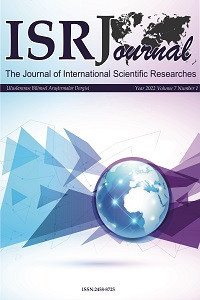Türkiye'de Bütçe Dengesi ve Enflasyon Arasındaki İlişkinin İncelenmesi: ARDL Sınır Testi Yaklaşımı
Anahtar Bütçe Açığı, Ebnflasyon, ARDL Sınır Testi.
Investigation of The Relationship between Budget Balance and Inflation in Türkiye: ARDL Boundary Test Approach
Budget Deficit, Inflation, ARDL Boundary Test,
___
- Abdioğlu, Z., & Terzi, H. (2009). Enflasyon ve bütçe açıkları ilişkisi: Tanzi ve patinkin etkisi. Atatürk Üniversitesi İktisadi ve İdari Bilimler Dergisi, 23(2), 195-211.
- Altunöz, U. (2018). Enflasyon ve bütçe açıkları arasındaki ilişki bağlamında Olivera Tanzi ve Patinkin etkisinin Türkiye’de geçerliliği. Vergi Dünyası Dergisi, 438, 21- 33.
- Altıntaş H., Çetintaş, H., & Taban, S. (2008). Türkiye’de bütçe açığı, parasal büyüme ve enflasyon arasındaki ilişkinin ekonometrik analizi: 1992–2006. Anadolu Üniversitesi Sosyal Bilimler Dergisi, 8(2), 185-208.
- Ashra, S., Chattopadhyay, S., & Chaudhuri, K. (2004). Deficit, money and price: The Indian experience. Journal of Policy Modelling, 26(3), 289-299.
- Atgür, M. (2021). An analysis of public sector budget deficits and inflation relationship in Turkey with ARDL bound test method. Sivas Cumhuriyet University Journal of Economics and Administrative Sciences, 22(1), 231-252.
- Banerjee, R., Boctor, V., Mehrotra, A., & Zampolli, F. (2021). Fiscal deficits and inflation risks: the role of fiscal and monetary regimes. BIS Working Papers No:1028.
- Bayrak, M., & Kanca, O. C. (2013), Türkiye’de Kamu Kesimi Açıklarının Nedenleri ve Fiyatlar Genel Düzeyi Üzerindeki Etkileri, İ.Ü. Siyasal Bilgiler Fakültesi Dergisi, 48, 91-111.
- Brown, R. L., Durbin, J., & Evans, M. J. (1975). Techniques for testing the constancy of regression relationships over time. Journal of the Royal Statistical Society, 37(2), 149-163.
- Cardoso, E. (1998). Virtual Deficits and the Patinkin Effect. International Monetary Fund. 45(4), 619-646.
- ISSN: 2458-8725
- Yayın Aralığı: Yılda 3 Sayı
- Başlangıç: 2016
- Yayıncı: Salih YILDIZ
Shirley Jackson'ın Distopyası “Piyango”da Konformizm ve Gelenek
Türkiye’de Din-Devlet İlişkileri Üzerine Bir Değerlendirme (1960-1971)
Psikolojik İyi Oluş ve Öz-Anlayış: Sosyal Çalışmacı Örnekleminde Bir Araştırma
Mahmut ÖZDEMİR, Koray ÇETİNCELİ
Hazır Giyim Sektöründe Marka Tercihlerinin Markov Zincirleriyle Öngörülmesi
Yeliz ŞAFAK, Vedat SAĞLAM, Murat SAĞIR
Yusuf YAZICI, Ahmet Mutlu AKYÜZ
Melani RİSTESKA, Hatun BOZTEPE TAŞKIRAN
Bir Tekstil Perakendecisinin Müşterileri İçin RFM Modeli ile Müşteri Segmentasyonu
Samet KANCA, Tuncay ÖZCAN, Yakup ÇELİKBİLEK
Türkiye'de Bütçe Dengesi ve Enflasyon Arasındaki İlişkinin İncelenmesi: ARDL Sınır Testi Yaklaşımı
Türkiye’de Risk Yönetimi Bağlamında Afete Hazırlıkla İlgili Yazılan Lisansüstü Tezlerin İncelemesi
Veri Zarflama Analizi ile Enerji Şirketlerinin Etkinlik Değerlendirmesi
